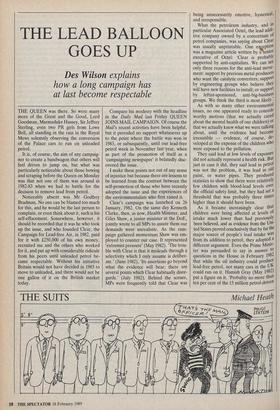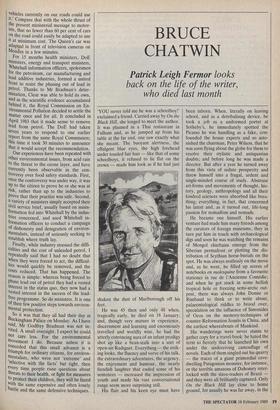THE LEAD BALLOON GOES UP
Des Wilson explains
how a long campaign has at last become respectable
THE QUEEN was there. So were many more of the Great and the Good, Lord Goodman, Marmaduke Hussey, Sir Jeffrey Sterling, even two PR girls from Lowe Bell, all standing in the rain in the Royal Mews solemnly observing the conversion of the Palace cars to run on unleaded petrol.
It is, of course, the aim of any campaig- ner to create a bandwagon that others will feel driven to jump on, but what was particularly noticeable about those bowing and scraping before the Queen on Monday was that not one of them was around in 1982-83 when we had to battle for the decision to remove lead from petrol.
Noticeably absent was Mr Godfrey Bradman. No one can be blamed too much for this, and he would be the last person to complain, or even think about it, such is his self-effacement. Somewhere, however, it should be recorded that it was he who took up the issue, and who founded Clear, the Campaign for Lead-free Air, in 1982, paid for it with £250,000 of his own money, recruited me and the others who worked for it, and put up with considerable ridicule from his peers until unleaded petrol be- came respectable. Without his initiative Britain would not have decided in 1983 to move to unleaded, and there would not be one gallon of it on the British market today. Compare his modesty with the headline in the Daily Mail last Friday QUEEN JOINS MAIL CAMPAIGN. Of course the Mail's recent activities have been helpful, but it provided no support whatsoever up to the point where the battle was won in 1983, or subsequently, until our lead-free petrol week in November last 'year, when as part of the promotion of itself as a `campaigning newspaper' it belatedly disc- overed the issue.
I make these points not out of any sense of injustice but because there are lessons to be learned from the contrast between the self-promotion of those who have recently adopted the issue and the experiences of the environmentalists who first raised it.
Clear's campaign was launched on 26 January, 1982. On the same day Kenneth Clarke, then, as now, Health Minister, and Giles Shaw, a junior minister at the DoE, jointly wrote to all MPs to assure them our demands were unrealistic. As the cam- paign gathered momentum Shaw was em- ployed to counter our case. It represented `extremist pressure' (May 1982). 'The trou- ble with Clear is that it misleads through a selectivity which I only assume is deliber- ate.' (June 1982), 'Its assertions go beyond what the evidence will bear; there are several points which Clear habitually disre- gards.' (July 1982). Behind the scenes, MPs were frequently told that Clear was
being unnecessarily emotive, hysterical, and irresponsible. What the petroleum industry, and in particular Associated Octel, the lead addi- tive company owned by a consortium of petrol companies, was saying about Clear was usually unprintable. One ewption was a magazine article written by ate, executive of Octel: 'Clear is probably supported by anti-capitalists. We can see only three reasons for the anti-lead move- ment: support by precious metal producers who want the catalytic converters; support by engineering groups who believe they will have new facilities to install; or support by leftist-sponsored, anti-big-business, groups. We think the third is most likely.' As with so many other environmental issues, no one appeared ready to concede worthy motives (that we actually cared about the mental health of our children) or that we actually knew what we were talking about, until the evidence had become irresistible — evidence, of course, de- veloped at the expense of the children who were exposed to the pollution.
They said lead at low levels of exposure did not actually represent a health risk. But just in case it did, they said lead in petrol was not the problem, it was lead in old paint, or water pipes. They produced statistics to show that there were relatively few children with blood-lead levels over the official safety limit, but they had set a threshold that was probably three times higher than it should have been.
As it became increasingly clear that children were being affected at levels of intake much lower than had previously been believed, and as evidence from the Uni- ted States proved conclusively that by far the major source of people's lead intake Was from its addition to petrol, they adopted a different argument, Even the Prime Minis- ter was persuaded to say in answer to questions in the House in February 1982 that while the oil industry could produce lead-free petrol, not many cars in the UK could run on it. Hamish Gray (May 1982) put a figure on it. 'Probably no more than ten per cent of the 15 million petrol-driven vehicles currently on our roads could use it.' Compare that with the whole thrust of the present ministerial message to motor- ists, that no fewer than 60 per cent of cars On the road could easily be adapted to use it at minimum cost. The Queen's car was adapted in front of television cameras on Monday in a few minutes.
For 15 months health ministers, DoE ministers, energy and transport ministers, Whitehall information officers, spokesmen for the petroleum, car manufacturing and lead additive industries, formed a united front to resist the phasing out of lead in petrol. Thanks to Mr Bradman's deter- mination, Clear was able to hold its own, and as the scientific evidence accumulated behind it the Royal Commission on En- vironmental Pollution decided to settle the matter once and for all. It concluded in April 1983 that it made sense to remove lead from petrol. The DoE had taken seven years to respond to one earlier report from the same Royal Commission; this time it took 30 minutes to announce that it would accept the recommendation.
Our experiences have been repeated with other environmental issues, from acid rain to the threat to the ozone layer, and have currently been observable in the con- troversy over food safety standards. First, once the controversy was under way, it was up to the citizen to prove he or she was at risk, rather than up to the industries to Prove that their practice was safe. Second, a variety of ministers simply accepted their civil service brief, usually based on misin- formation fed into Whitehall by the indus- tries concerned, and used Whitehall in- formation officers to conduct a campaign of dishonesty and denigration of environ- Mentalists, instead of seriously seeking to establish where truth lay.
Finally, while industry stressed the diffi- culties and the cost of unleaded petrol, I repeatedly said that I had no doubt that When they were forced to act, the difficul- ties would quickly be removed, and the costs reduced. That has happened. The reason is simple: whereas being forced to phase lead out of petrol they had a vested interest in the status quo, they now had a vested interest in the success of the lead- free programme. So do ministers. It is one of their few positive steps towards environ- mental protection.
So it was that they all had their day at Buckingham Palace on Monday. As I have said, Mr Godfrey Bradman was not in- vited. A small oversight. I expect he could not care less. For the environmental movement I do. Because unless it is conceded that this small advance is a triumph for ordinary citizens, for environ- mentalists, who were not 'extreme' and `selective with the facts' but right, then every time people raise questions about threats to their health, or fight for measures to protect their children, they will be faced with the same expensive and often lonely battle and the same defensive techniques.



















































 Previous page
Previous page